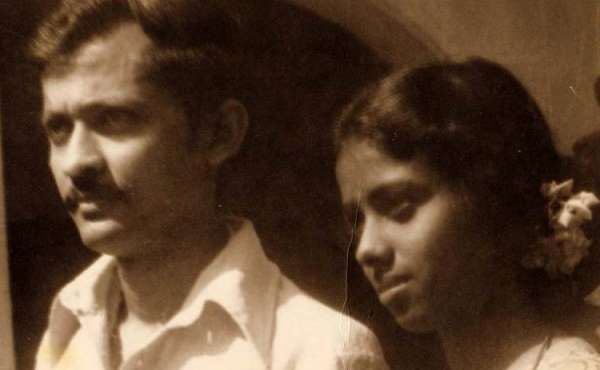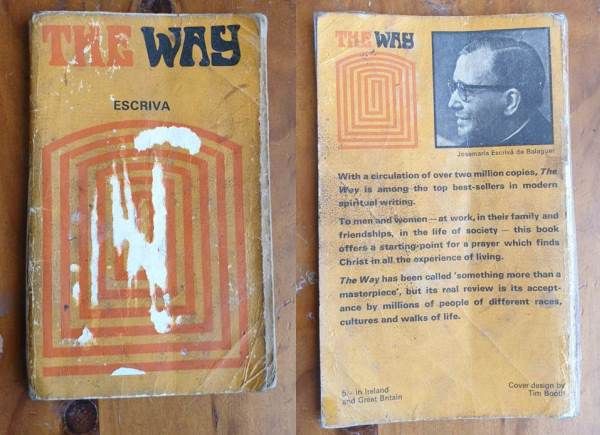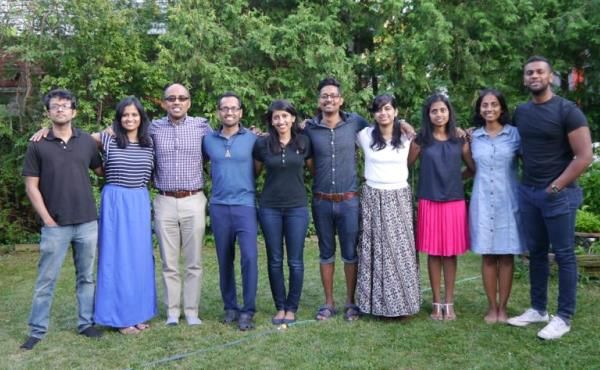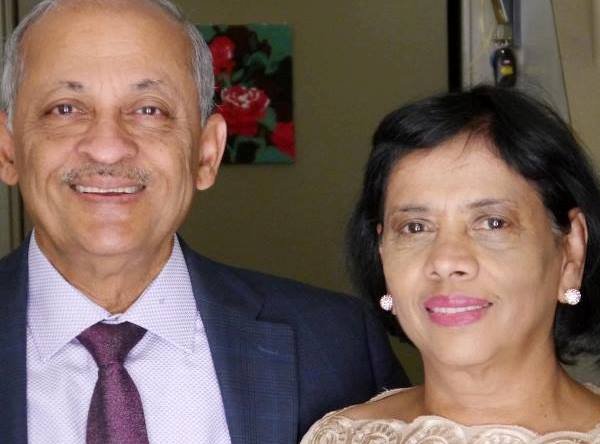Tell us a little about yourself. What do you do for work?
My name is Joseph Stephen Hyginus. I was born in Sri Lanka and was baptized within two weeks of my birth. I did my undergraduate degree in B.Sc. Engineering at the University of Sri Lanka, and then life began to take its twists and turns. After working as a mechanical engineer in Sri Lanka for almost 10 years, I moved with my family to Zambia due to political unrest, and found work as a sectional engineer at a coal mine before working as a maintenance manager at Victoria Falls power station in Livingstone. After a while, we moved again, this time to Canada. Once settled in Toronto, I worked in several different occupations before finally getting hired as an engineer, working in the design of mobile power stations and distribution transformers. I also worked as a project engineer in a food industry until finally retiring from the engineering profession. Today, I work as a court interpreter in the public service at the Ontario Court of Justice.
You immigrated to Canada in 1987. How did you and your wife make that decision, and what was that like?
My wife and I got married in Sri Lanka in 1975, and by 1983, we had six children. We were then displaced by the ethnic unrest and violence that was unleashed against the minority Tamil community, and we had to move to the northern part of the country. I was able to get an engineering job against all odds and we lived in the north for two years. As the situation in the country went from bad to worse, we looked for ways to leave the country. During those trying times, I wrote a letter to Pope –now Saint– John Paul II, asking for his prayers and suggesting that he visit our country. I was thrilled to receive a reply through the papal nuncio assuring us of the Pope's prayers and well wishes. (The Pope finally did visit Sri Lanka in 1995 to beatify Fr. Joseph Vaz, but we were no longer living in Sri Lanka at that point.)
"As the situation in our country was not getting better, we decided to move to Canada, seeking a better life for our family."
It was not feasible for us to leave the country as a whole family with six children, so we decided that I would go to Zambia, where my brother-in-law was working as an engineer. Within three months, I was fortunate to secure a job, and my wife and children came along in January 1986. However, our situation as expatriates was limited and we were on the lookout for a safe place to settle down with our family. My wife's sister was living in Toronto, Canada, at that time. As the situation in our country was not improving, we decided to move to Canada, seeking a better life for our family.

We landed in Montreal on a cold winter evening in mid December. It was difficult to adjust to the harsh weather conditions. After a few months living in Montreal, we moved to Toronto to be closer to my in-laws. Looking for an apartment for a family with six small children was a big challenge. Throughout my career, I mostly worked in office settings where I never had hands-on experience. My credentials were not recognized in Canada and I had to literally start from scratch. My first job was in a mail room sorting mail and then as a handyman doing some retrofit work for street cars and light rail trains. It was a hard life for someone who had always worked behind a desk and among papers in an office.
My wife felt sorry about my plight and suggested I go back to school to relearn my field. So I went to a college where I could study AutoCAD design and drawing, and was thus able to get hired as a draftsman. Within five years, I obtained the license to practice as a professional engineer in the province of Ontario.
Saint Josemaria's book The Way fell into your hands while you were still living in Sri Lanka. How did the book speak to you at that moment in your life?
My brother in law received a copy of The Way in English from an Italian friend who was studying in Sri Lanka because of his father's work. This book became very popular among my family members, and was read by many at our home (at that point, my wife and I and our first two children were staying in the same house as my wife's family). So the book probably came into my hands in 1977. The front cover was missing so I couldn’t even see the title of it. But the forthright and soul searching points caught my attention and I was enthralled by the contents of the book. Ironically, this same copy of the book is still with my brother in law who lives in Sydney, Australia. It has travelled to many parts of the world and has been read by many. There are book marks and notes scribbled all over it.
"The forthright and soul searching points caught my attention... I found the book different from any other I had read before."
I found the book different from any other I had read before. We were trying to be faithful to the teachings of the Church. By 1980, we had four children and were having a hard time making ends meet. This book gave me consolation and assurance to continue in our struggle. God spoke to us through these lines and phrases, encouraging us to be open to life in spite of the difficulties and the criticisms we faced. During our relocation to the northern part of Sri Lanka after the civil war, I didn’t know the whereabouts of our copy of the book. While in Zambia, however, I ended up with another book by Josemaría Escrivá, Friends of God, thanks again to my brother-in-law who received a copy through his Italian friend.
It's interesting that an English translation of a spiritual book written by a Spanish priest in the 1930s could appeal to a recently married Sri Lankan engineer on the other side of the globe in the late 1970s. Was there a specific chapter or point that struck you in a particular way? Why?
I don’t exactly remember a specific chapter or point that struck me, but as a whole, it helped me to take my faith to a higher level and to trust Divine Providence. I used to copy points from The Way and stick them to the wall and doors, expecting everyone to read those lines. I would say that most of the points in the book challenged me to go against the current and to be faithful to the teaching of the Church. All I can say now is that this book, The Way, was instrumental for me and my wife, in our family and in our marriage.

Sri Lanka and Canada are very different places in terms of culture, climate, geography, population, language, etc. How did you and your family adapt and become part of a new community while still maintaining your own identity and values?
I still miss the tropical climate of Sri Lanka. Nevertheless, the myriads of opportunities in Canada and the multicultural atmosphere appealed to me. We received support and help from many people and organizations. We had friends and relatives from our country who were living in Toronto. We celebrated birthdays and special days with family and friends. Within two years of our arrival to Canada, our seventh child was born and that kept us busy. After our seventh child’s birth, I was offered permanent employment as a draftsman in an engineering establishment. This opportunity provided the security and support needed to continue our struggle. Within the next five years, three more children were born and we had no time to sit and daydream.
As your family's life underwent some pretty dramatic changes, did the advice and spiritual encouragement offered in The Way continue to have a personal impact? If so, in what ways?
Yes, in many ways. Within a short time after having our seventh child, my wife was expecting another child. This put strain on her and I too was worried about the future. We were new to the country and we were renting a three bed room apartment, with one person’s earning to face the future. This was somewhat frightening at that time. Somehow or other I remembered reading The Way and I desperately wanted to find a copy of it. As it so happened, one day when I went to our parish church, St. Timothy’s, I found a leaflet about Opus Dei. There was some contact information at the bottom and as soon as I went home, I made a call and inquired whether I could buy a copy of The Way. They told me the book was available and that I could come at any time to purchase it. So when I went there, I was received very cordially and was shown many books. At that time I was only interested in The Way and purchased a copy. When I was about to leave, the gentleman who received me very casually slipped into my hand a small card with information about an "evening of recollection" taking place around the area where we were living. He suggested coming to the next recollection at a church nearby and to give it a chance. That was it.
So I took the time to attend my first recollection. The meditations were preached by Fr. José Luis Soria and coincidentally, one of the topics was birth control. I vividly remember him saying that every marital act that is not open to life is sinful. Immediately after the recollection, I caught up with him before he was getting into his car and asked to make an appointment to see him with my wife.
"After that meeting, all my fears and anxieties were gone and I was prepared to face the future come what may."
One Saturday morning, I went with my wife to meet Fr Soria at the centre. I was so relieved to hear him telling us not to be afraid in accepting children, as they are a blessing from God. He told us about other families who have many children in Toronto, which was complete news to us: we had never met any families among our relatives and friends who had more than three children at that time. Fr. Soria blessed the baby in the womb of my wife and assured us of his prayers for our family. After that meeting all my fears and anxieties were gone and I was prepared to face the future come what may. The baby whom Fr. Soria blessed was born on October 2nd, and we named her Angel Therese. I eventually learned that Saint Josemaría founded Opus Dei on that date, the feast of the Holy Guardian Angels. Within a few months after Angel was born, we were able to start renting a spacious four bedroom town house. Within two years, our ninth child, Miriam, was born on November 28th.
I continued attending the different means of formation, including three-day overnight retreats. Little by little, I was getting to know the spirit of Opus Dei and realized that perhaps God was calling me as well. On December 3rd, the feast of St. Francis Xavier –the Jesuit who brought the Catholic Faith to Sri Lanka– I wrote the letter asking for admission to Opus Dei as a supernumerary. It was a very emotional moment for me and the tears falling from my eyes wet the paper on which I was writing. This year marks 25 years since I wrote that letter.
You and your wife are parents of a large family. Over the years, how have you managed to balance your professional work with the demands of being a father - as well as a grandfather - to so many?
First and foremost, all the credit goes to my wife, who gave up her career as an accountant to dedicate more time to our children and our home. Now that everyone is grown up, when I look back I honestly have no words to describe how we did it. We had only one vehicle –a minivan– for the majority of the time. Driving the children to school, dropping and picking them up from their activities and grocery shopping etc. were all done by me because my wife couldn't drive. But despite all the ups and downs in our life, we were able to hold parties and celebrate birthdays at our home. I was fond of taking photos and videos, covering all of these family events on my video camera. We have run out of space in our house to store photo albums: we keep some of them in a trunk box in the garage. Whenever we watch those home videos, I am amazed to see how happy we were as a family in those days. It was a treat to have small children around us playing and keeping us on the go. I think everything was made possible with the help of God and the caress of our dear mother Mary.
When I look back, I realize that Providence led me to find my wife, the most important thing that ever happened to me. Everything else seems like a "parting of the Red Sea" of obstacles and hardships for us to walk through, and I see now all the ways in which God blessed our family.

Unfortunately, on Easter Sunday this past year, a number of churches and hotels in Sri Lanka were bombed. After your experience putting down roots in a new place, what are your hopes and dreams for your home country? Do you have plans to go back?
Going back to live there after a long time out of the country is a challenging option. We left Sri Lanka 35 years ago. Now that our children and grandchildren are in Canada and the United States, my wife wouldn’t like to live away from them. My long-term plan is to escape the winter by going to Sri Lanka, spending some time with my sisters who are still living there. So far, this dream has never materialized because of my work schedule and family commitments. Now that I am in my pre-retirement age, I hope this dream becomes a reality in the very near future. Convincing my wife to leave the children and grandchildren for an extended period of time is another challenge. But anything is possible if God wants it.
Sri Lanka is called the pearl of the Indian Ocean. The scenic beauty of the country –with lush vegetation, mountain peaks and balmy beaches– takes your breath away. The temperature is warm in the coastal area and cooler in the central area. Like everywhere in the world, the partisan politics is causing insecurity and fear among minority religious and ethnic groups. Mistrust between races and religious groups are dividing the people. If these problems are addressed and resolved, Sri Lanka could become a paradise island and people would be flocking to go back. It won't be surprising if I become one of those to go home after all these years. But will this ever happen? Only time will tell.

